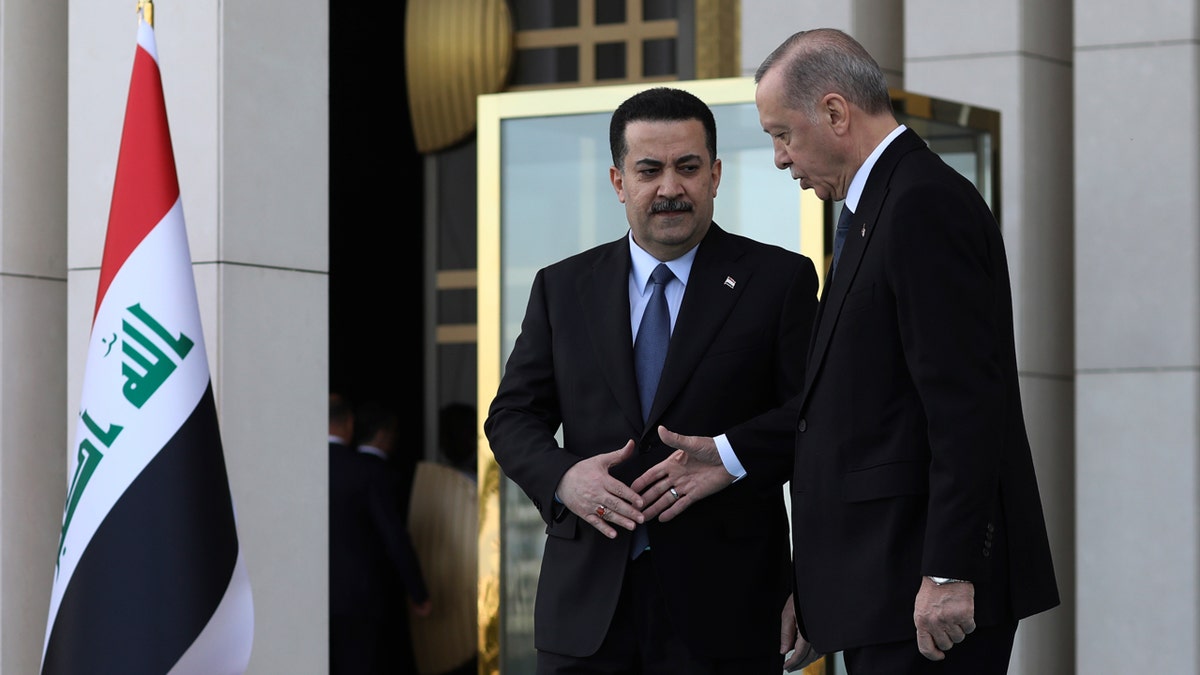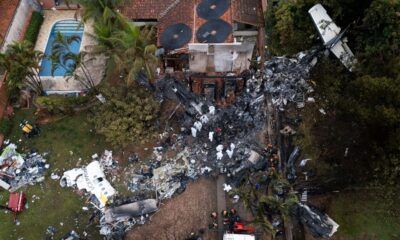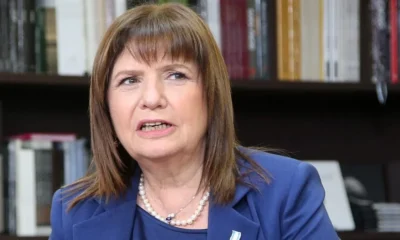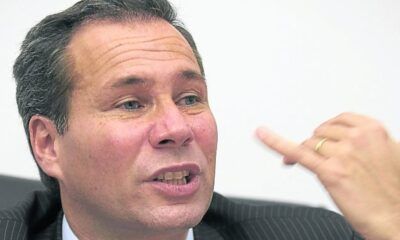INTERNACIONAL
Turkish President makes first official visit to Iraq in over a decade

Turkish President Recep Tayyip Erdoğan arrived in Iraq on Monday for his first official visit in more than a decade as Ankara seeks greater cooperation from Baghdad in its fight against a Kurdish militant group that has a foothold in Iraq.
Other issues also loom large between the two countries, including water supply and exports of oil and gas from northern Iraq to Turkey, halted for more than a year.
TURKEY’S ERDOGAN FACES UNCERTAIN FUTURE AFTER SHOCK ELECTION LOSSES EXPERT SAYS
Erdogan, whose last visit to Baghdad was in 2011, when he was prime minister, met with Iraqi President Abdul Latif Rashid and Prime Minister Mohammed Shia al-Sudani as they inked agreements on water management, security, energy and economic cooperation.
«I believe that my visit and the agreements just signed will constitute a new turning point in Turkey-Iraq relations,» Erdoğan said in a joint news conference with al-Sudani.

Turkey’s President Recep Tayyip Erdoğan, right, and Iraq’s Prime Minister Mohammed Shia al-Sudani shake hands during a welcome ceremony in Ankara, Turkey, Tuesday, March 21, 2023. Erdoğan was set to make his first official visit to Iraq in more than a decade on Monday, April 22, 2024 as his country seeks greater cooperation from Baghdad in its fight against a Kurdish militant group that has a foothold in northern Iraq. (AP Photo/Burhan Ozbilici)
Al-Sudani said they discussed «bilateral security coordination, which will meet the needs of both parties and confront the challenges posed by the presence of armed elements that may cooperate with terrorism and violate the security of the two countries.»
Erdoğan’s visit «comes at a sensitive and dangerous time,» al-Sudani added, citing Israel’s war against the Hamas militant group in Gaza — a war that has had ripple effects across the region.
Erdoğan said the leaders had «consulted on the joint steps we can take against the PKK terrorist organization and its extensions, which target Turkey from Iraqi territory,» referring to the Kurdistan Workers’ Party, or PKK, a Kurdish separatist movement banned in Turkey.
The PKK has maintained bases in northern Iraq’s semiautonomous Kurdish region.
Erdoğan had previously announced a major operation against the PKK during the summer, with the aim of «permanently» eradicating the threat it poses. He did not specify what actions Turkish forces would take in Iraq but Turkish forces have in the past carried out numerous ground offensives against PKK in northern Iraq and Turkish jets frequently target suspected PKK sites.
Ankara now aims to create a 19-25 mile deep security corridor along the joint border with Iraq, Turkish Defense Minister Yasar Guler told journalists last month.
The insurgency — the PKK is fighting for an autonomous Kurdish state in southeast Turkey — has claimed tens of thousands of lives since the 1980s and Turkey and its Western allies have labelled PKK a terrorist organization.
Baghdad has long complained that Turkish actions in Iraq against the PKK violate its sovereignty, but appears to be acquiescing with Ankara’s operations.
In March, after a meeting between the Iraqi and Turkish foreign ministers, Baghdad announced that the Iraqi National Security Council had issued a ban on the PKK, although it stopped short of designating it as a terrorist organization. Erdoğan on Monday praised the ban.
Al-Sudani told journalists during a visit to Washington last week that Iraq and Turkey have «true interests with one another and common projects.» He noted that the PKK has long had a presence in northern Iraq, «but we are not allowing any armed group to be on Iraqi territory and using it as a launchpad for attacks.»
Ankara has argued that PKK’s presence in Iraq threatens the planned construction of a major trade route, the Iraq Development Road, that would connect the port in Basra, southern Iraq, to Turkey and Europe through a network of rail lines and highways.
Baghdad may take a similar approach to the PKK as it has taken to Iranian Kurdish dissident groups based in northern Iraq.
The presence of Iranian dissidents had become a point of tension with Tehran, which periodically launches airstrikes on their bases in Iraq. Last summer, Iran and Iraq reached an agreement to disarm the groups and relocate their members from military bases to displacement camps.
Energy issues and water rights are also key in Iraq-Turkey ties.
An oil pipeline running from the semiautonomous Kurdish region to Turkey has been shut down since March 2023, after an arbitration court ruling ordered Ankara to pay Iraq $1.5 billion for oil exports that bypassed Iraq’s central government in Baghdad. The sharing of oil and gas revenues has long been a contentious issue between Baghdad and Kurdish authorities in Irbil.
In recent years, Iraqi officials have complained that dams built by Turkey are reducing Iraq’s water supply.
The Tigris and Euphrates rivers, which provide most of Iraq’s fresh water, originate in Turkey. Experts fear that climate change is likely to exacerbate existing water shortages in Iraq, with potentially devastating consequences.
CLICK HERE TO GET THE FOX NEWS APP
Mustafa Hassan, a Baghdad resident, said he hopes that Erdoğan’s visit «will help to solve problems related to water, because Iraq is suffering from a water scarcity crisis, and this affects agriculture.»
Erdoğan said Ankara was aware of the water problems Iraq faces and that the two countries have set up «a joint permanent committee which is going to help through cooperation … taking our shared interests into consideration.»
INTERNACIONAL
Elevan a 41 los muertos por el triple choque en Minas Gerais: es la peor tragedia en rutas de Brasil en casi dos décadas
-
POLITICA3 días ago
Patricia Bullrich le respondió a Victoria Villarruel tras las críticas por el gendarme detenido en Venezuela
-
POLITICA2 días ago
El descargo de Longobardi tras su salida de Radio Rivadavia: «Me hizo acordar cuando Cristina ejecutó mi despido en Radio 10»
-
INTERNACIONAL2 días ago
Atropello múltiple en un mercado de Navidad en Alemania: al menos dos muertos y más de 60 heridos
-
POLITICA2 días ago
Guillermo Castello: «Kicillof está utilizando la caja de la provincia para posicionarse políticamente»
-
POLITICA20 horas ago
Nisman: el Gobierno acepta el pedido del fiscal y levanta el secreto sobre los espías inorgánicos de la SIDE y el Ejército
-
CHIMENTOS1 día ago
Se confirmó el escandaloso motivo de la crisis entre Javier Milei y Yuyito González: «Él estaba cerca de Graciela Alfano»








































